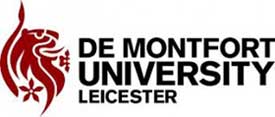Fashion Designing courses
De Montfort University

- UK
- World Rank : 601
- Visit Website
On this course, you can specialise in menswear, womenswear and or fashion knitwear, and will study a range of topics including fashion illustration, innovative concept development, pattern cutting and computer-aided design (CAD) for fashion and design development - preparing you for a career in a creative multibillion-pound industry where you can benefit from countless opportunities to develop, progress and learn new skills.
You will be introduced to the academic, professional, industrial and commercial challenges of design practice. There are opportunities to work with leading brands on live projects, work placements and competition awards, thanks to the course’s unparalleled links with the UK and global apparel industry.
The first year provides grounding in fashion and design through practical, creative and technical classes and projects, while the second year is more focused, with emphasis on experimentation, in-depth project research and 3D development.
You will gain skills such as tailoring and fashion prediction, thanks to the major project in the third year giving you the opportunity to set your own briefs and create a final collection of work to showcase your unique vision and talent, as well as entering national and international competitions.
We are delighted DMU is ranked in the Top 10 for Fashion and Textiles in the UK, according to The Guardian University Guide 2020 and DMU was named best in learning experience in 2019 by The Business of Fashion, the internationally renowned website which assesses the world’s top programmes.
Key features
Typical entry requirements
A good portfolio and normally:
Plus five GCSEs grades 9-4 including English Language or Literature at grade 4 or above.
We will normally require students to have had a break from full time education before undertaking the Access course.
International students
If English is not your first language an IELTS score of 6.0 overall with 5.5 in each band, or equivalent when you start the course is essential. English Language tuition, delivered by our British Council accredited Centre for English Language Learning, is available both before and throughout the course if you need it.
| Type of Institution | Public |
| Campus Setting | Urban |
| Endowment | £1.17 million |
| Number of Campuses | 4 faculties |
| Number/Percentage of International Students | 23205 |
| Total number of Professors | 3240 |
| Student Satisfaction Rate | 86% |
| Graduate Job Rate | 97.3% |
| Number of Residence Vacancy | Around 3000 |
| International fee | Undergraduates- £13240 (annual) Postgraduates- £15950 (annual) |
| Number of Academic Programs | UG, PG, Part time, distance, blended |
| Mode of Program | Full time, distance and online |
| Average Graduate Salary | 19800 pounds a year |
| Field of Study | Avg.Fees |
|---|---|
| Art, Design and Humanities: | £13,750 |
| Business and Law | £13,750-£14,550 |
| Media | £13,750 - £14,250 |
| Engineering | £14,250 |
| Computing | £14,250 |
| Health and Life Sciences | £13,250 - £14,250 |
| Nursing BSc | £14,950 |
| Expenses | Estimated cost in pounds |
|---|---|
| Undergraduate tuition fee | 13,250- 14950 |
| Postgraduate tuition fee | 13600-15,900 |
| On campus accommodation | 5,000-6040 |
| Average cost of living | 97-110 per week |
DMU International Scholarship up to 1500 pounds
| Tuition Fees in UK (1st Year Average) | MS: £17276 | MBA: £17276 | BE/Btech: £16632 | BBA: £15130 | BSc: £16632 | MFin: £19000 | MA: £15560 | MIM: £18241 | MEM: £16950 | MArch: £14271 | BHM: £12662 | MIS: £15344 | MEng: £12876 | MBBS: £28865| MPharm: £15452 |
| Average Accomodation & Food Costs in UK | £850 to £1,050 a month |
| Entrance Exams in UK | TOEFL: 88 | IELTS: 6.5 | PTE: 59 | GMAT: 590 |
| Work and Study in UK | Permitted for 20 hours/week with a valid study permit. |
| Post Study Work Permit in UK | 2 Year after graduation depending on the course. |
| Cost of Student Visa in UK | £348 |
| Student Visa in UK | Your nationality, duration of your stay and purpose of your stay are the three essential factors for UK visa. For Non-EU students UK visa is mandatory. |
| Intakes in UK | There are mainly two intakes in UK: January/February & September/October. |
| Top Job Sectors in UK | IT Engineering, Product Design, Mobile Development, Designers, Logistics, etc. |
| Economy in UK | Growth Rate: 1.3% (2018) 1.4% (2019) 1.4% (2020e), 6th Largest Economy in the World by Nominal |
Tuition & fees :
£ 14,250
Hostel & Meals :
£ 6,063
Total
£ 20,313